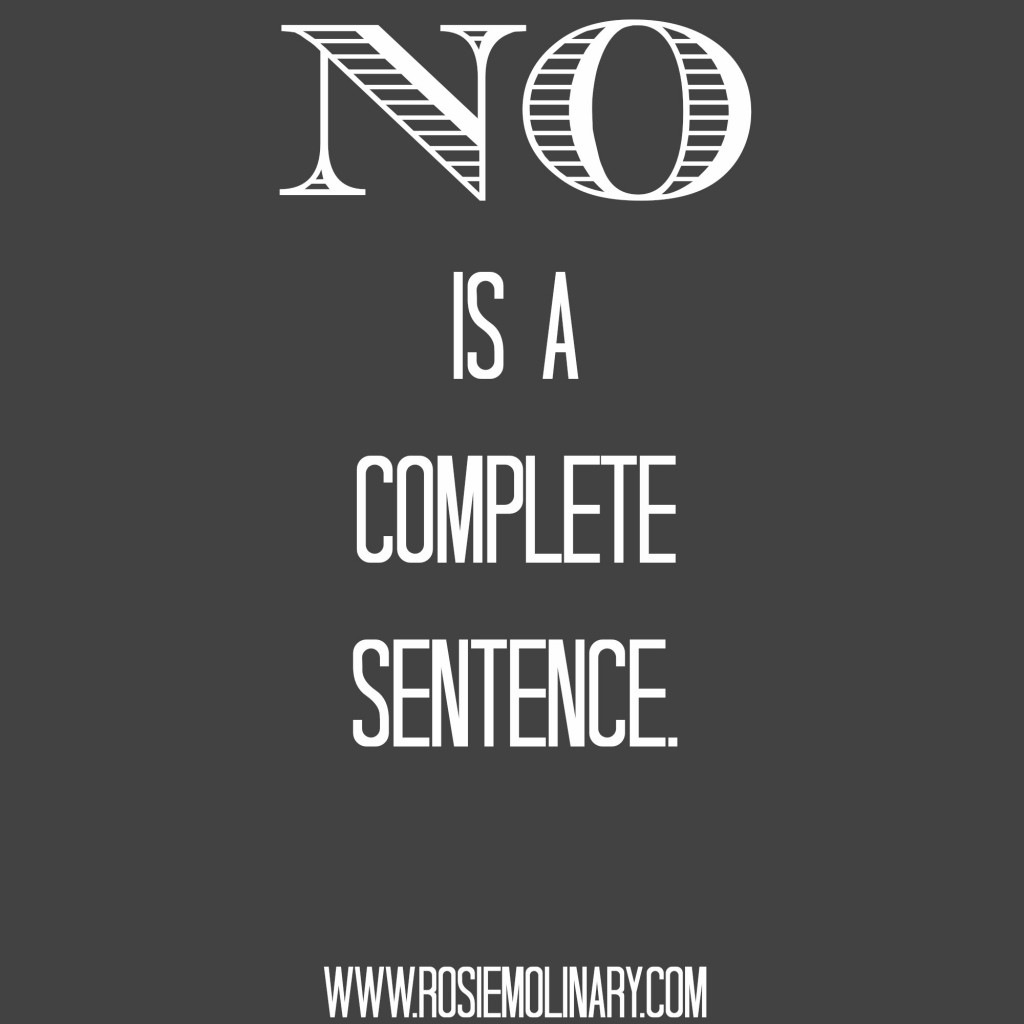Technically, we all know how to say no. It is just that the saying of no can be such a hard thing. We don’t want to hurt someone’s feelings or disappoint them or we may even be a little sad or disappointed that we need to say no. And so saying the word, even in its two letter simplicity, isn’t all that easy.
I get that.
And, yet, we’ve all heard this clear adage (so popular these days that when I tried to figure out who said it, I found about 5 different attributions so who knows who said it first): No is a complete sentence.
Over the last couple weeks, we’ve learned about The Continuum of Wholeheartedness, a powerful filter for discerning when you need to say no and the Realities of No, some insights about saying no that make the whole prospect feel a lot less dire. Today, we’re looking at choosing your words when you say no. Here are four suggestions for turning down the next opportunity that you just can’t do wholeheartedly.
Go sweet and simple. I’ve done it all when it comes to saying no from saying nothing at all, just hoping that the invitation fades away (please note this option isn’t listed here as I don’t actually recommend it) to issuing a dissertation length negative response. Sometimes, it is just as simple—for you and the person hearing it—to say, “No thank you.”
Provide perspective. In general, I like to provide a little insight as to why I am saying no. The person may not care at all (likely, she doesn’t), but I just find that it helps me.
One boundary that I have, for example, is that I do whatever I can to not miss more than one bedtime ritual with Happy a week (especially on weeknights where the routine is really critical for him and the sweetness is really critical for me). And so when I already have an evening commitment and get a second request for that week, I just tell the person that I have a personal rule that I don’t miss more than one bedtime ritual on a week night and I’ve already got a commitment that week.
You can also provide perspective by saying, “I am not doing that any more.” For example, you might have provide a fair amount of pro-bono service in the past but found that you were donating more of your work than earning a livelihood for your family. It is absolutely okay to answer that sort of request with something like, “I love what you are doing but, right now, I am not able to take on any more pro-bono work.”
And, finally, you can provide perspective by saying that it is not a good fit for you. Something like this might work:
Thank you for asking, but I just don’t think I can do that as well as someone who is more adept at: fill in the blank here.
Don’t provide perspective. That said, you are allowed to say no because it is Monday night and The Voice is on and you have a date with your couch. And you also have the right to keep that to yourself, if you want, in which case you don’t have to provide perspective. When you are looking for words for those situations, just say:
I am so sorry, but I am not able to take on any new responsibilities right now.
or
Thanks for thinking of me. I am so sorry to have to say no, but I know you’ll find just the right person.
Buy time. Sometimes we need to say no but, holy cow, this person is right in front of me asking or on the phone asking and I am sweating because she makes me nervous and I can feel myself caving and this is so scary so I cannot say no is what is going through your head. When that happens, just buy yourself some time with
I need to get back to you.
Then you can get perspective and rehearse how to deliver the no in person or just send the no via email.
While saying no takes some practice, the good news is it becomes easier, and, when you are consistent, you’re actually able to use more of your energy for what the world most needs from you and for what you most need for yourself which is a powerful way to live.



